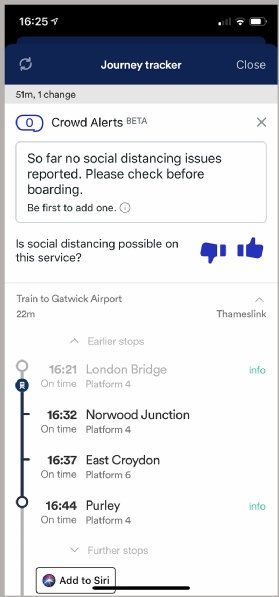
kasto - stock.adobe.com
CIO interview: Mark Holt, CTO, Trainline
The coronavirus pandemic has reduced train travel significantly, but for the rail ticketing app it’s been an opportunity to focus on using innovative technologies to help support passengers in new ways
Trainline chief technology officer Mark Holt hasn’t let the coronavirus pandemic derail his plans to push data-led insight to rail and coach passengers. In fact, the opposite is true – it’s helped the transport specialist to think of even more innovative ways to help keep commuters informed.
While Covid-19 meant the number of people using public transport plummeted, Holt and his colleagues in the firm’s 400-strong IT team knew it wouldn’t be long before lockdown eased and the return to work began. As part of this process, Trainline’s development team spent six weeks during the lockdown period developing Crowd Alerts, a crowdsourced feature on the Trainline app that tells travellers whether or not it’s possible to socially distance on a specific train.
“We’re just trying to help the rail industry level some of the demand on the various services,” says Holt, referring to his team’s data-led approach. “And by doing it in a real-time way, it is actually very helpful – we can tell when trains are going to be less busy. That’s the kind of data we’re looking to push back to our customers.”
This innovative thinking is part and parcel of the creative way that Trainline works when it comes to developing new services. While coronavirus has required the business to operate in a novel way, Holt believes that the firm was well prepared for the day-to-day challenges that remote working and social distancing has necessitated.
“We’ve always had quite a strong remote working culture. We’re big believers in allowing people to work the way they want to get the job done. And so the change for us was actually quite small. We already had the tools, technologies and processes in place,” he says.
Adjusting to change
Holt speaks to Computer Weekly via video conference, although some of Trainline’s workers are now beginning to return to the firm’s socially distanced office in central London. In the week we speak, as many as 100 of the company’s 600-plus staff are working in the office on a daily basis. “There will be a set of tipping points – people are starting to feel a bit more confident,” he says.
The key to operational continuity during lockdown has been the long-standing establishment of an effective working culture, suggests Holt. Coronavirus has had a lower impact on operational activities than might have been anticipated because people in the various development teams trust each other and collaborate well.

“We’ve always had quite a strong remote working culture, so the change for us was quite small. We already had the tools, technologies and processes in place”
Mark Holt, Trainline
“We have a very low tolerance for people who aren’t able to drive the organisation or work with the organisation. Sometimes you just get people who crash into it and expect to be able to get things done and that doesn’t work. We’ve developed an organisation over many years that is actually pretty resilient and is pretty good at change,” he says.
Holt says his team had a strong project roadmap in place before the Covid outbreak. When the pandemic spread and lockdown began, the IT team readjusted about 25% of that roadmap. That change also meant about 25% of the people in the business had to focus on different activities. Luckily, the readjustment caused few issues.
“That is one of the hallmarks of a good organisation – it’s able to change. Does everybody throw their hands up in the air and go, ‘Oh my God, you want me to work on something different?’ Or do they go, ‘Yeah, that’s fine. I’ll get on with a different thing, then’. Actually, that macro-level agility is super-important,” he says.
Trainline’s workplace isn’t confined to London – the firm uses nearshore development partners. The nature of this geographically disparate work environment meant development teams at Trainline were already used to having a morning stand-up, where some people are standing in front of a whiteboard in London and others are conferencing in from Portugal.
It’s not all been plain sailing – Holt estimates that Trainline’s IT team saw “a small dip in productivity” of about 5% after lockdown began. That dip was mostly due to the change that came from people who were at home with children and were trying to juggle childcare and work.
“But now we feel like we’re pretty much back to back to full capability and we’ve launched some great things,” he says.
Paying attention to customers
As well as launching Crowd Alerts, the Trainline team has had to ensure the firm’s customers feel as if they’re continuing to receive a great service – even when they might not be commuting as normal. Holt says one of the main things the IT team focused on in the first few days of lockdown was processing refunds for passengers who were unable to travel.
“We were doing that significantly faster than almost anywhere else in the rail industry,” he says. “And that’s one of the benefits with electronic tickets. Refunding paper tickets is a total nightmare of a process. If you go onto the Trainline app, you hit the refund button and the refund comes through 24 or 48 hours later.”

Holt says Trainline concentrated on developing and rolling out its e-ticket infrastructure prior to lockdown. That effort meant customers were able to receive their refunds quickly. Holt hopes this customer-focused attention gives people confidence going forward that Trainline is a company that does the right thing.
“If you’ve bought a ticket from us and something bad happens, we want people to feel they are able to get the refund they’re entitled to,” he says. “I think everyone’s just trying to make the best of the situation at the moment, from a travel industry perspective.”
Holt says Trainline’s financial year starts in March, which runs parallel to the rail industry. That hard deadline meant the executive team had completed its macro-level planning and its quarter planning by the start of March. Fortuitously, that process meant his development team went into lockdown with a good plan of what they wanted to achieve in the first half of the year. Those plans are now coming to fruition.
“We’re expecting to land 55 deliverables over the next couple of weeks, which is very significant – that’s more than we’ve ever done before, and those are those are big-scale deliverables,” says Holt, explaining how his team has continued its development effort during the coronavirus pandemic.
Transforming the business
Computer Weekly last profiled Holt in spring 2019, since when there’s been a significant change in the business. Formerly backed by private equity (PE) firm KKR, the company floated on the London Stock Exchange in June 2019 after an initial public offering.
Holt says KKR’s ownership instilled strong business principles into the firm. “They’re not one of these PE firms that just puts a bunch of numbers into a spreadsheet and expects you to hit them. They recognise that there’s a real business to run so we never had unreal expectations,” he says.
That focus, says Holt, meant the executive team at Trainline always had a business plan that it felt it could hit. “When we then moved from private equity ownership to public markets ownership, we again came out with a plan that was just a continuation of the previous plan – and it was a plan that we felt we could hit,” he says.
“I think we’ve done a good job since then, although obviously Covid has put a bit of a spanner in the works, as it has with all travel businesses. But we see the recovery happening and I think we all feel good about that. Although it might slow down some of the plans that we have, actually the tailwinds for our business are exactly the same.”
Read more travel CIO interviews
- American Express Global Business Travel CTO David Thompson on incident response.
- Brede Nielsen, Avinor – the Covid-19 pandemic put Avinor’s IT head at the centre of the airport operator’s response.
- Simon Moorhead of the Rail Delivery Group discusses integration.
Some of the developments that his team has pioneered in the past year or two will help. One of these initiatives is SplitSave, a split-ticketing app feature that can help customers find a cheaper way to travel than buying a single ticket for a long journey. Holt says the firm’s pioneering initiative is powered by machine learning.
“There were companies offering split-ticket services before we launched ours, and they would typically take 45 seconds to a minute-and-a-half to run through all the possible permutations, which caused a huge strain on the rail industry systems. We’ve used machine learning infrastructure that searches the data and comes back within 300 milliseconds,” he says.
Once again, says Holt, the aim is to boost the customer experience. “It was a complicated project involving the whole organisation, but we created a great product out the end of it – and it’s just slightly disappointing that lockdown happened and we weren’t able to reap all the benefits for our customers that we hoped we’d be able to,” he says.
Reaching the destination
Trainline believes the real-time travel information it holds, and which powers its app, is the key to sponsoring a long-term change in citizen behaviour. Consumers who are armed with data can make more informed choices about the forms of transport they use, both now as they begin to return to work and long into the future.
“There is a desire for people to travel more ecologically – they don’t want to be generating as much carbon. We will definitely see a shift from air to rail for medium-distance travel. And there will be a reticence for people to get on planes. I think trains and coaches will be a beneficiary of that,” says Holt.
“So it’s a solid business – we generate cash and we produce something that customers actually want. That might sound basic, but it’s very advantageous in the post-Covid world. We're not constantly fighting to convince people that they need to buy a new thing. They will get back on trains and they will need to figure out how to travel in the most effective way possible. That’s where we want to help.”









